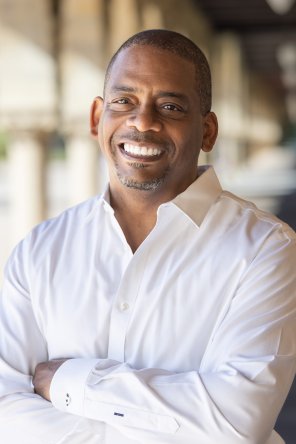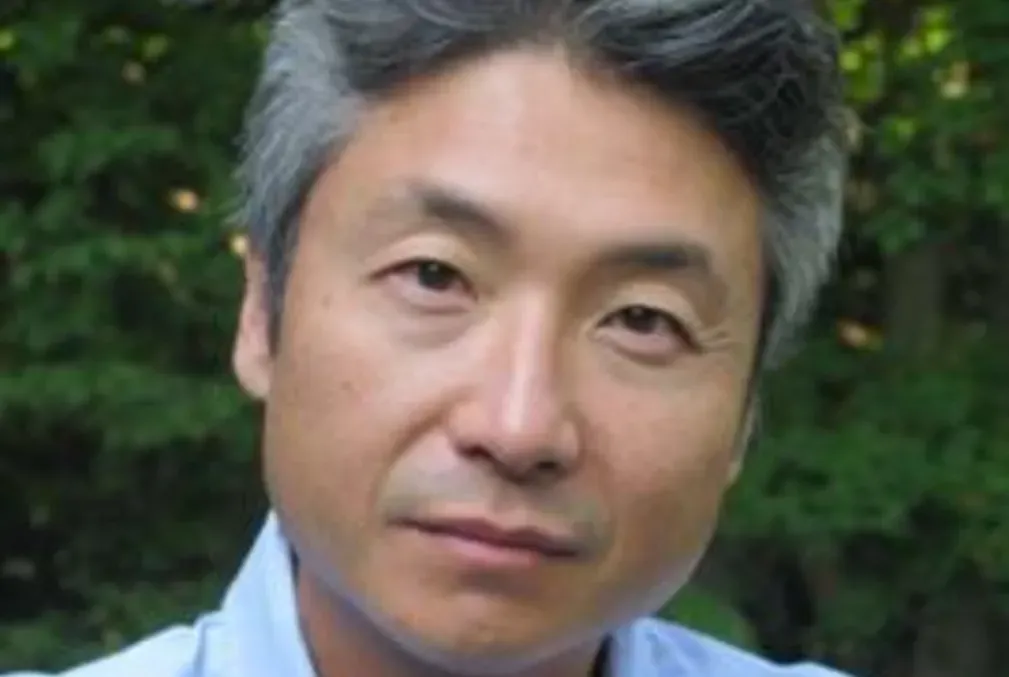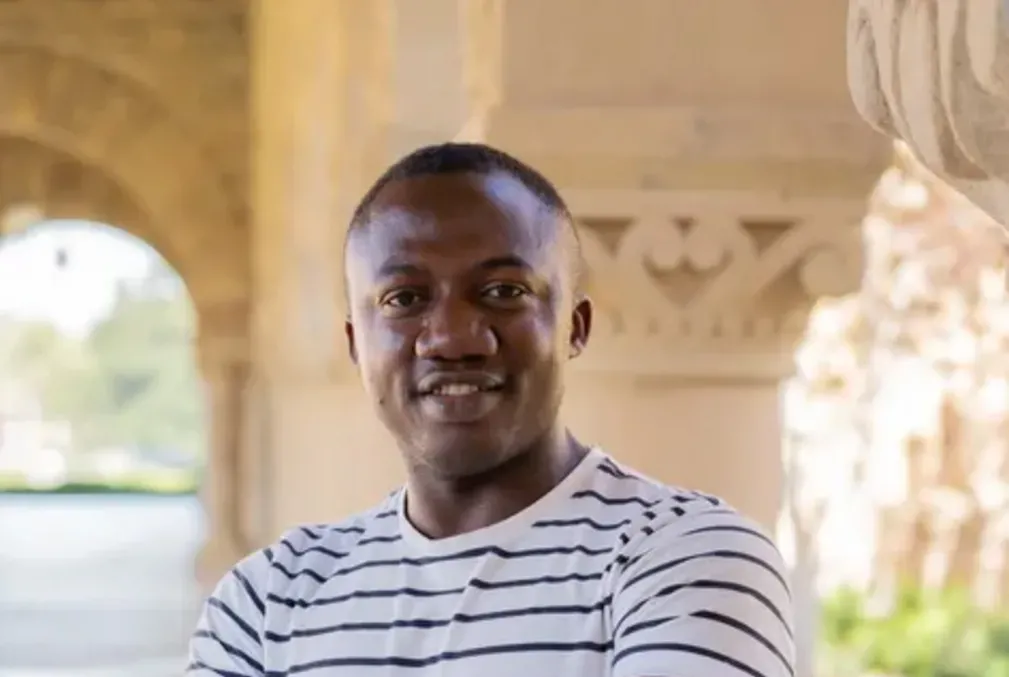A. Van Jordan, professor of English, on poetry, movies, and Einstein
The cinephile and award-winning poet recently discussed how film inspires his work and shared some advice for aspiring poets.
Cinema. Physics. Race. Superheroes. The poet A. Van Jordan, who was appointed a professor of English at the start of fall quarter and is one of the newest members of the Creative Writing Program in Stanford’s School of Humanities and Sciences, explores a wide range of topics in his work.
In particular, he has drawn on historical research to mold themes and characters in his poetry collections. In one volume, he imagines the life of MacNolia Cox, who as an eighth grader, in 1936, became the first Black finalist in the National Spelling Bee. In another, a series of poems traces the life of Albert Einstein.
Jordan (like MacNolia Cox) was born in Akron, Ohio. He earned a bachelor’s degree in English from Wittenberg University in 1987, a master’s degree in organizational communication from Howard University in 1990, a Master of Fine Arts in creative writing from Warren Wilson College in 1998, and an MFA in screenwriting from the Vermont College of Fine Arts in 2016.
He is the author of four volumes of poetry: The Cineaste (W. W. Norton & Co., 2013); Quantum Lyrics (W. W. Norton & Co., 2007 hardcover, 2009 paperback); M-A-C-N-O-L-I-A (W. W. Norton & Co., 2005), which won the Anisfield-Wolf Book Award; and Rise (Tia Chucha Press, 2001), which won the PEN Oakland Josephine Miles Award. His next book, When I Waked, I Cried to Dream Again (W.W. Norton & Co., forthcoming), is scheduled for publication in June. Jordan has been awarded a Guggenheim Fellowship, Pushcart Prize, Whiting Award, United States Artists Fellowship, and Lannan Literary Award in Poetry.
He has taught at several institutions, including the University of North Carolina, Greensboro; the University of Texas, Austin; Rutgers University, Newark, where he served as the Henry Rutgers Presidential Professor; and at the University of Michigan, where he was the Robert Hayden Collegiate Professor of English Language and Literature and director of the Helen Zell Writers’ MFA Program.
In a recent interview, Jordan shared his thoughts on poetry and teaching. The interview is part of a series of Q&As with newly appointed faculty in the Creative Writing Program.
This Q&A has been edited for clarity and length.
Question: How did you become interested in poetry?
Jordan: When I lived in Washington, D.C., I was working as an environmental journalist, and I was drawn into the vibrant art scene there. I met a number of poets, musicians, and visual artists at the time. I grew up in a working-class Black community that did not have a class of artists walking around, particularly African American artists. I felt I had found my people in D.C., and I felt free to explore my writing, which I had suppressed for much of my life. I was in my mid-20s then.
Question: What is it about cinema that sparks your poetic imagination? Are there any themes or aspects of film you find yourself drawn toward exploring in your poetry?
Jordan: I think all writing has to be visual art, and this is especially true with poetry. Cinema is a great analogy for the visual movement that takes place both in narrative and in lyrical progressions. It’s sad to see so many movie theaters closing all around the country. I think of going to the movies as one of the few communal experiences with art—different than going to the opera, or the ballet, or even big concerts—that anyone could afford to go to and enjoy. If you were raised in a community in which the majority of the people worked in factories, going to the movies was a great family outing on the weekend. Today, we’re being acculturated to watching stories on our individual screens. So I’m more drawn to the communal experience of seeing a movie as opposed to specific themes; a good movie is a good movie.
Question: Who is a director or screenwriter, or director-screenwriter, you admire and why?
Jordan: I think the two filmmakers I admire the most are John Sayles and Spike Lee. They each have a singular voice that shines through in each film, they each make films that no one else would dare make, and they’re both underrated. They also make films that would be poor films in the hands of a director with less vision. Sayles’ Lone Star is a brilliant murder mystery that’s so much bigger than the murder, and it’s possibly a perfect screenplay; Do the Right Thing is a tour de force of beauty—the writing, the blocking of scenes, the cinematography; every aspect is sublime—despite its harrowing subject matter.
Question: How would you describe your style of poetry?
Jordan: I wouldn't.
Question: In your award-winning collection Quantum Lyrics, a series of poems tracks the life of Albert Einstein. What inspired this series, and how did your view of the scientist change—if it changed—after doing research on his life and work?
Jordan: I had seen a photograph of Einstein working on an equation at a chalkboard in a classroom. He’s looking over his shoulder at his students: a classroom of young Black men. Einstein visited with students and lectured at Lincoln University in Pennsylvania when he was given an honorary degree there in 1946. I wanted to know more about Einstein’s relationship to Black America at that time. So often, we excuse the bad behavior of white men of that period by saying, “They were men of their time.” Well, Einstein was what was known then as a Race Man, speaking out against racism at a time—particularly for a Jewish man—when it would’ve been easy to be silent on the subject. I hadn’t read anything about this part of his life, so I wanted to know more.
Question: What do you think poets can learn from scientists?
Jordan: I think physicists and poets both work in metaphor. Thought experiments are really in the realm of figurative language, so maybe it’s a question of what scientist can learn from poets.
Question: What drew you to Stanford?
Jordan: I came as a visiting professor and fell in love with the campus and students. I’m also incredibly enamored with the Department of English and the Creative Writing Program.
Question: What’s it been like to teach Stanford students?
Jordan: I’ve enjoyed how open-minded the students have been to experimentation; they’re often quite fearless when it comes to approaching the blank page. And they ask a lot of questions, which is incredibly important if you want to be a writer. You have to interrogate yourself and the world around you.
Question: What is some advice you would impart to aspiring poets?
Jordan: You don’t have to read everything. … But whatever you read, you have to read with an annotating mind. You have to understand how the books you read are made.
Question: What project(s) are you working on now?
Jordan: I’m writing about loss these days, sometimes in personal essays and sometimes in poems. But, at this point, who knows where this will lead me? Like the students, I’m still asking questions.




